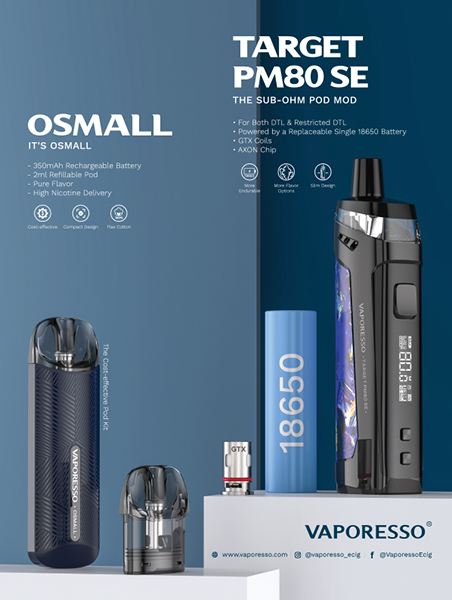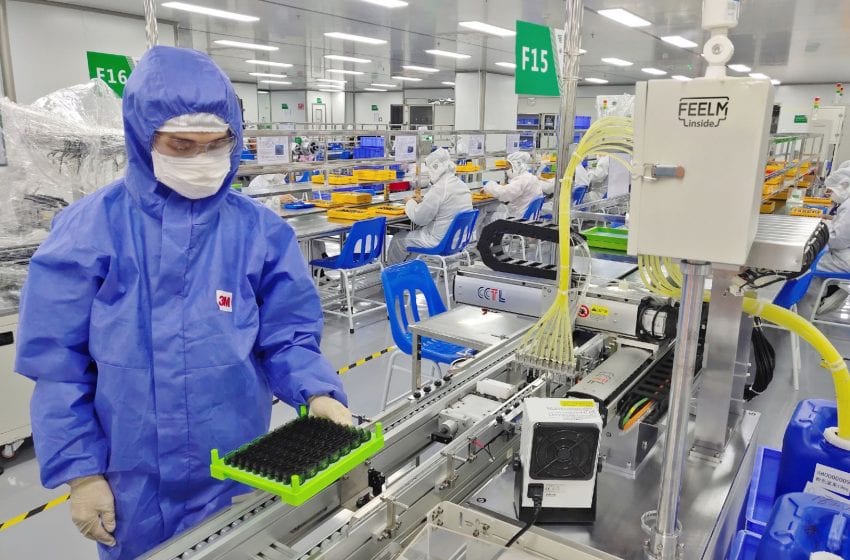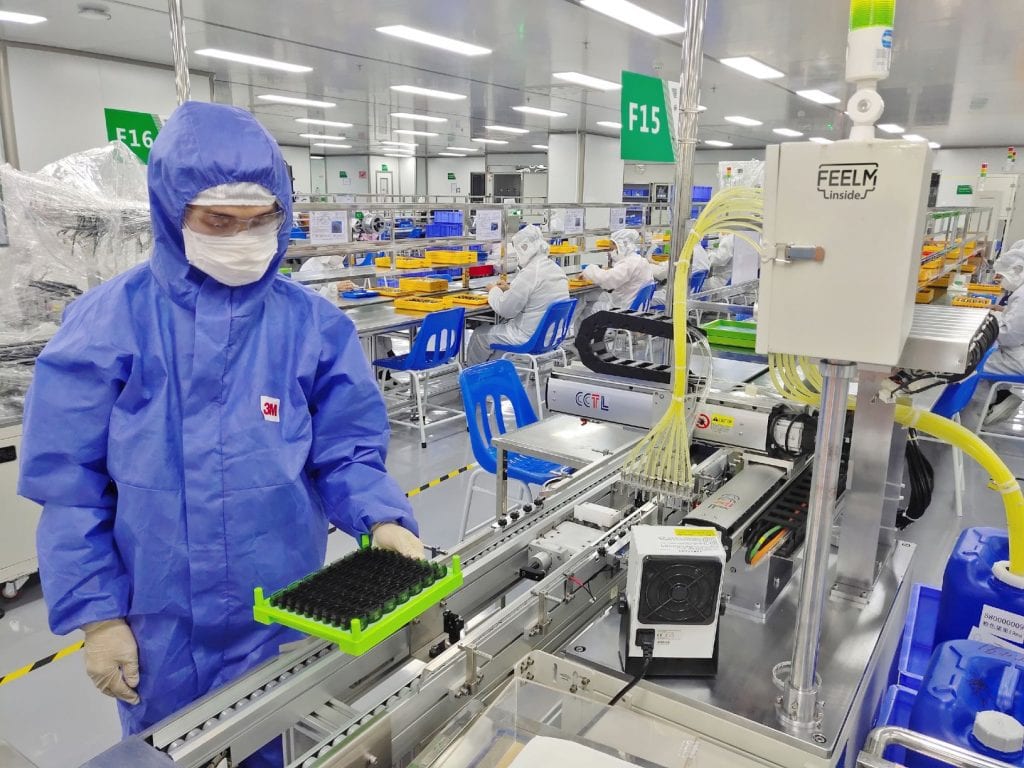
After a brief shutdown of all operations, vapor hardware manufacturers in China are now operating at more than 80 percent of pre pandemic production.
By Timothy S. Donahue
It’s not the same as it was this time last year. However, vapor hardware manufacturers in China that produce products for the world market are back in service after a brief hiatus due to the Covid-19 pandemic. Mostly based in Shenzhen, the e-cigarette capital of the world, companies say that they are working hard at implementing new standards and processes in order to keep employees and customers safe.
They are also playing catch-up in collecting data for premarket tobacco product authorizations (PMTA) in the U.S. market. “The coronavirus is indeed having an impact on the PMTA process,” says Welford Ou, CEO of Smoktech, a major manufacturer. “For example, the behavioral investigations have been stopped, and it is also taking more time for us to prepare all the products for the PMTA.” As of this writing, PMTA applications are due to the U.S. Food and Drug Administration (FDA) on May 12.
Smoore Technologies, the parent to Vaporesso and Feelm, says it “took strong and comprehensive measures” in advance of the virus’ outbreak. “We set up disease prevention and control teams in each of our facilities before the Chinese Spring Festival holiday. Dating back to the 20th of January, Feelm teams started to collect information, investigate employees’ conditions, prepare epidemic prevention supplies and disinfect public areas,” said Sofia Luo, marketing director for Feelm. “Before getting back on track, Feelm handed out a Covid-19 prevention and control booklet to each employee, providing scientific support to enhance health security.”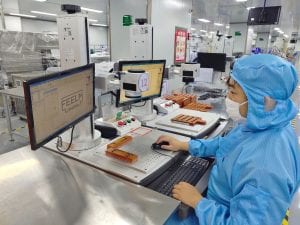
All Smoore facilities are now back up to at least 85 percent of pre-pandemic production, according to Luo. She says Feelm is already shipping goods to the U.S. and has been since the middle of February. “Smoore and its subsidiaries have enough key materials inventory, and all of our supply chain has recovered and is back in production,” she said. When asked whether there was a supply shortage, Luo replied, “In general, the impact of supply shortage is under control.”
Smoktech is getting back to its normal operations and more workers are expected to be hired as the virus outbreak is brought under control, according to Ou, who added that the company is awaiting the return of some workers from Wuhan (located in the Hubei province and the epicenter of the pandemic) where the quarantine was officially lifted on April 8.
“The sales are doing well even with the Spring Festival and a long time staying at home for virus control,” says Ou. “Our challenge is to get more skilled workers in [a] short amount of time to meet the growing demand. My concern for the world market is [that] hopefully they will embrace vaping and see it is better and safer than smoking cigarettes.”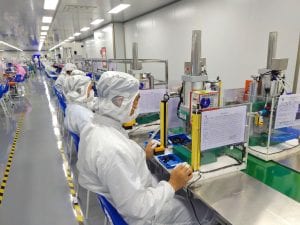
Smoore took early action in order to prevent a massive global disruption in the vapor and e-cigarette market, according to Luo. She said that the company started to communicate frequently with its clients at the early stages of the pandemic. “We reminded customers to pay great attention to the epidemic. With the development of Covid-19 worldwide, most of our customers have been prepared (in terms of staff safety and inventory),” Luo stated. “The [virus] was a black swan event of great magnitude.” A “black swan” event refers to an unforeseen occurrence that typically has extreme consequences; in contrast, a “gray rhino” event is an obvious yet ignored threat.
Luo says that, although Covid-19 is spreading all over the world, the demand for e-cigarettes hasn’t changed. “Vapor stores in many countries remain open. And we know some brands are increasing the online sales and e commerce service,” she said. “We forecast [that] the 2020 industry will be the same size or a slight increase compared with 2019. And after PMTA, [the industry] will get a big increase.”
When it comes to issues like the limitation of freight and whether the virus could be on packaging, Feelm says the information from official sources are that there’s no limitation of freight, and the World Health Organization (WHO) confirms coronaviruses do not survive for extended periods on objects such as letters or packages and that it’s safe for people to receive packages from China.
Luo says Feelm will continue to stay updated on related information and adds that the company will spare no efforts to guarantee each product is clean and safe in all aspects from purchasing raw materials to exporting goods. Feelm products have been approved by several international quality and safety systems, according to Luo. “As a leading company in the automatization area, Feelm has the strength to embrace health and security first,” she says. “Disease prevention and control is our responsibility. Feelm is well prepared to protect employees’ safety to recover production and to win the battle.”
At its factories, Smoore and its other entities’ staff are well-equipped with protection products such as masks, gloves and other safety equipment, according to Luo. “Disinfection in public areas is proceeded twice a day. Exclusive dust bins for used face masks are placed throughout the facilities,” explains Luo. “All these measures lay a solid foundation to protect Feelm and all Smoore employees’ safety. This allows for the greatest possibility for full production recovery.”
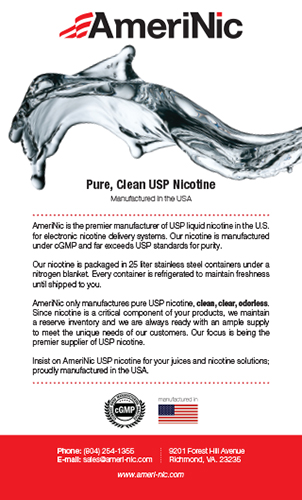
THE NEW NORMAL
United we stand, together we win. Since the outbreak of Covid-19 at the end of last year, the Chinese government has implemented a series of powerful measures that have effectively controlled the spread of the virus, according to Sofia Luo, marketing director for Feelm, a major atomizer company based in Shenzhen, China.
“At present, production recovery has become the top priority. Allied with government regulations and a corporate plan, Feelm employees started to work online at the beginning of February. Now, all facilities serving Feelm clients are getting back on track,” explains Luo. “Thanks to Feelm’s advantages with having a strong supply chain and the ability to deal with emergencies, Covid-19 has had little impact on production. Once getting back to work, the production capacity will recover soon.”
In order to ensure the prevention of a recurrence of the virus within the company, Feelm has implemented an eight-step policy to enhance protocols and address health and security concerns for its employees. According to Luo, the first step requires all employees to register their current health status and any other conditions they may have.
“They must also inform us of the dates they are returning/returned to Shenzhen, the people they have met, etc.,” she says. “They must archive related documents setting up an exceptional first line of defense. Step two: any employees returning to Shenzhen from other places must isolate themselves at home for 14 days. They must work from home or online if applicable, according to Luo. Only if without any suspected symptoms like fever and coughing, are they permitted to return to the office. All employees must wear a face mask at [the] factory.”
Step three is all factories must have epidemic prevention supplies ready, according to Luo. Employees must wear a face mask while going out and have their temperature taken before stepping into the factory. They must also wash their hands after touching anything and always have disinfectants at hand.
Step four involves having strict Allied Social Sciences Association (ASSA) access control systems in place. Employees must wear identification badges and have their temperature taken twice a day. “Anyone whose body temperature is over 37.3 degrees Celsius should stay at home for medical observation,” says Luo. “Protecting yourself is protecting others.”
Luo explains that step five is one of the most vital steps. She says the company actively disinfects all public areas in factories twice a day. “Office areas are disinfected once a day after work. Public space and dormitories are also once a day,” she says. “Production area disinfection is arranged by departments.”
Step six involves maintaining the cleanliness in production workshops. “Enter the air shower room after disinfection, no more than six persons at one time. [The] distance between two workstations should be wider than one meter,” says Luo. “Reduce the number of employees at one production line. Add extra production lines if necessary. Spare no efforts to guarantee production safety.”
The final two steps are more lifestyle changes, according to Luo. Step seven centers on employees keeping a one-meter distance from each other while dining. “Dining out is temporarily prohibited. Keep [a] one-meter distance while queueing (getting in line) and dining. Wash hands before and after dinners,” Luo explains. “[A] disposable tableware policy has also been adopted. We also disinfect tables and chairs after using three times a day. Eat at ease, work at ease.”
Step eight asks for Feelm employees to avoid crowds while commuting. “Walk, ride or drive to work. Try to avoid public transport, if possible,” she says. “If you must, avoid touching anything. Clean phones and keys with wet tissue or medical alcohol often.”
